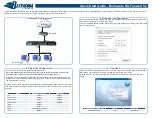
DDR3 Keepout Region
DDR3 Interface
Encompasses Entire
DDR3 Routing Area
179
AM3359, AM3358, AM3357, AM3356, AM3354, AM3352, AM3351
SPRS717J – OCTOBER 2011 – REVISED APRIL 2016
Product Folder Links:
AM3359 AM3358 AM3357 AM3356 AM3354 AM3352 AM3351
Peripheral Information and Timings
Copyright © 2011–2016, Texas Instruments Incorporated
7.7.2.3.3.5 DDR3 Keepout Region
The region of the PCB used for DDR3 circuitry must be isolated from other signals. The DDR3 keepout
region is defined for this purpose and is shown in
. This region should encompass all DDR3
circuitry and the region size varies with component placement and DDR3 routing. Additional clearances
required for the keepout region are shown in
. Non-DDR3 signals should not be routed on the
same signal layer as DDR3 signals within the DDR3 keepout region. Non-DDR3 signals may be routed in
the region provided they are routed on layers separated from DDR3 signal layers by a ground layer. No
breaks should be allowed in the reference ground or VDDS_DDR power plane in this region. In addition,
the VDDS_DDR power plane should cover the entire keepout region.
Figure 7-51. DDR3 Keepout Region
7.7.2.3.3.6 Bulk Bypass Capacitors
Bulk bypass capacitors are required for moderate speed bypassing of the DDR3 and other circuitry.
contains the minimum numbers and capacitance required for the bulk bypass capacitors. Note
that this table only covers the bypass needs of the AM335x DDR3 interface and DDR3 devices. Additional
bulk bypass capacitance may be needed for other circuitry.
Table 7-62. Bulk Bypass Capacitors
NO.
PARAMETER
MIN
MAX
UNIT
1
AM335x VDDS_DDR bulk bypass capacitor count
2
devices
2
AM335x VDDS_DDR bulk bypass total capacitance
20
μ
F
3
DDR3 number 1 bulk bypass capacitor count
2
devices
4
DDR3 number 1 bulk bypass total capacitance
20
μ
F
5
DDR3 number 2 bulk bypass capacitor count
2
devices
6
DDR3 number 2 bulk bypass total capacitance
20
μ
F
(1) These devices should be placed near the devices they are bypassing, but preference should be given to the placement of the high-
speed (HS) bypass capacitors and DDR3 signal routing.
(2) Only used when two DDR3 devices are used.
















































